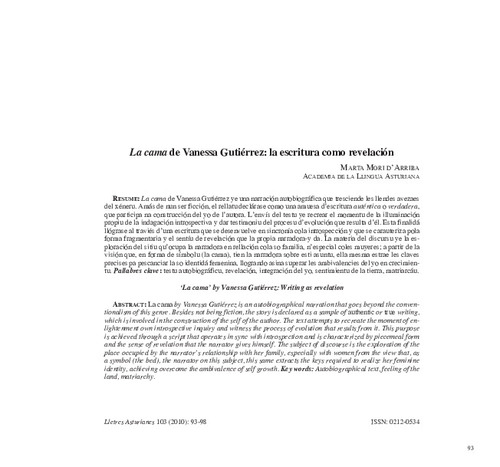La traducción nel sistema lliterariu asturianu (I): Les "fábules" d'Antón de Marirreguera
Otros títulos:
Translation in the Asturian literary system (I). Antón de Marirreguera Fábules
Autor(es) y otros:
Fecha de publicación:
Editorial:
Academia de la Llingua Asturiana
Citación:
Descripción física:
Resumen:
Nesti trabayu esamínase, dende la perspectiva de la Teoría de los Polisistemes, el papel que desempeña la torna na construcción del sistema lliterariu asturianu nel so momento fundacional, na obra d’Antón de Marirreguera. En primer llugar, analícense les fontes y les convenciones estétiques emplegaes pol autor na ellaboración de les fábules. Darréu, coméntense los procedimientos usaos p’adaptar la materia lliteraria clásica a la cultura asturiana, baxo’l presupuestu de qu’esta adaptación pue interpretase como una traducción equivalente a una mediación cultural orientada a llograr un productu aceptable nel contestu de llegada. Los testos resultantes, amás de mecer rasgos propios de la lliteratura forana culta coles característiques propies de la cultura popular asturiana y la lliteratura oral, dan aniciu a un sistema llingüísticolliterariu nuevu, l’asturianu, que nel sieglu XVII convive colos sistemes llatinu y castellanu dientro d’un polisistema multillingüe
Nesti trabayu esamínase, dende la perspectiva de la Teoría de los Polisistemes, el papel que desempeña la torna na construcción del sistema lliterariu asturianu nel so momento fundacional, na obra d’Antón de Marirreguera. En primer llugar, analícense les fontes y les convenciones estétiques emplegaes pol autor na ellaboración de les fábules. Darréu, coméntense los procedimientos usaos p’adaptar la materia lliteraria clásica a la cultura asturiana, baxo’l presupuestu de qu’esta adaptación pue interpretase como una traducción equivalente a una mediación cultural orientada a llograr un productu aceptable nel contestu de llegada. Los testos resultantes, amás de mecer rasgos propios de la lliteratura forana culta coles característiques propies de la cultura popular asturiana y la lliteratura oral, dan aniciu a un sistema llingüísticolliterariu nuevu, l’asturianu, que nel sieglu XVII convive colos sistemes llatinu y castellanu dientro d’un polisistema multillingüe
This paper examines from the perspective of Polysystem theory, the role of translation in the construction of the Asturian literary system in its foundational moment in the work of Anton Marirreguera. First, we analyze the sources and aesthetic conventions used by the author in the elaboration of myths. It then discusses the procedures used to adapt the classic literary material to the Asturian culture, under the assumption that this adaptation can be interpreted as a translation equivalent of a cultural mediation in order to achieve an acceptable product in the context of arrival. The resulting texts, not only mixed traits of foreign literature cultured with characteristics owned by Asturian popular culture and oral literature, giving rise to a new literary-linguistic system, the Asturian, who lives in the seventeenth century together with the Latin and Castilian systems in a multilingual system
This paper examines from the perspective of Polysystem theory, the role of translation in the construction of the Asturian literary system in its foundational moment in the work of Anton Marirreguera. First, we analyze the sources and aesthetic conventions used by the author in the elaboration of myths. It then discusses the procedures used to adapt the classic literary material to the Asturian culture, under the assumption that this adaptation can be interpreted as a translation equivalent of a cultural mediation in order to achieve an acceptable product in the context of arrival. The resulting texts, not only mixed traits of foreign literature cultured with characteristics owned by Asturian popular culture and oral literature, giving rise to a new literary-linguistic system, the Asturian, who lives in the seventeenth century together with the Latin and Castilian systems in a multilingual system
ISSN:
Colecciones
- Artículos [37532]
- Ciencias de la Educación [1067]
Ficheros en el ítem





